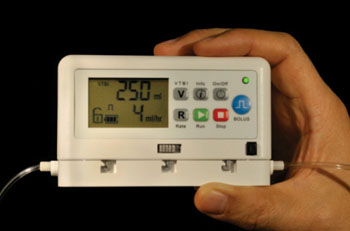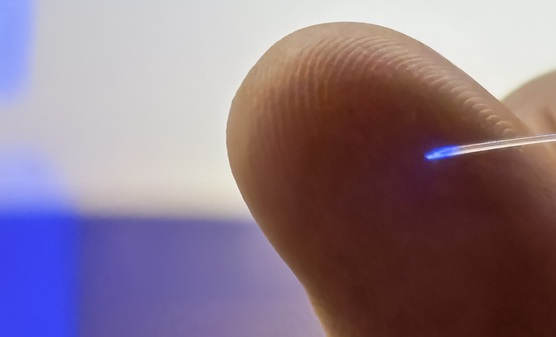Low Cost Ambulatory Pump Fulfills Discrete Infusion Needs
|
By HospiMedica International staff writers Posted on 10 Nov 2014 |

Image: The Nimbus ambulatory infusion pump (Photo courtesy of Zyno Medical).
A novel ambulatory infusion pump meets the changing needs of patients in different healthcare settings, such as in a hospital, at the home, and in alternate care environments.
The Nimbus ambulatory infusion pump is a single-use, recyclable device designed for the delivery of medications and fluids to a patient for subcutaneous, epidural, perineural, and intravenous (IV) infusions. The system combines a simple user interface and reliable technology to provide both continuous rate and patient-controlled analgesia (PCA) bolus infusions. The low profile pump, when combined with the carrying case, also allows the user to complete daily activities while administering infusion therapy in a discrete manner.
The single-use, easy-to-program ambulatory pump offers a cost effective solution, since there are no batteries needed and no prefilled cassettes to purchase. The availability of a pump recycling service helps reduces costs even further. Safety features include single function buttons to avoid errors, upstream and downstream occlusion alarms, and an anti-free-flow design. The Nimbus ambulatory infusion pump is a product of Zyno Medical (Natick, MA, USA), and has been approved by the US Food and Drug Administration (FDA).
“We are pleased to launch our latest infusion technology that focuses on a safe and effective ambulatory infusion delivery system for patient care, and a cost efficient solution for the clinician in this current healthcare environment,” said Chaoyoung Lee, MD, president of Zyno Medical. “It exemplifies our commitment to our philosophy, ‘Simplicity equals Safety.’ By leveraging Zyno Medical’s experience in infusion technologies, we designed this easy to use infusion system with the patient, nurse, and clinician needs in mind.”
Related Links:
Zyno Medical
The Nimbus ambulatory infusion pump is a single-use, recyclable device designed for the delivery of medications and fluids to a patient for subcutaneous, epidural, perineural, and intravenous (IV) infusions. The system combines a simple user interface and reliable technology to provide both continuous rate and patient-controlled analgesia (PCA) bolus infusions. The low profile pump, when combined with the carrying case, also allows the user to complete daily activities while administering infusion therapy in a discrete manner.
The single-use, easy-to-program ambulatory pump offers a cost effective solution, since there are no batteries needed and no prefilled cassettes to purchase. The availability of a pump recycling service helps reduces costs even further. Safety features include single function buttons to avoid errors, upstream and downstream occlusion alarms, and an anti-free-flow design. The Nimbus ambulatory infusion pump is a product of Zyno Medical (Natick, MA, USA), and has been approved by the US Food and Drug Administration (FDA).
“We are pleased to launch our latest infusion technology that focuses on a safe and effective ambulatory infusion delivery system for patient care, and a cost efficient solution for the clinician in this current healthcare environment,” said Chaoyoung Lee, MD, president of Zyno Medical. “It exemplifies our commitment to our philosophy, ‘Simplicity equals Safety.’ By leveraging Zyno Medical’s experience in infusion technologies, we designed this easy to use infusion system with the patient, nurse, and clinician needs in mind.”
Related Links:
Zyno Medical
Latest Critical Care News
- Aptamers Enable Real-Time Biomarker Tracking Without Blood Draws
- Specialized Dressing with Sensor Monitors pH Levels in Chronic Wounds
- AI Model Could Help Diagnose Spinal Cord Disease Up To 30 Months Earlier
- 3D-Printed Swallowable Robot Could Perform Gastrointestinal Procedures
- Next-Gen Hydrogel Could Transform Soft Tissue and Organ Repair
- Engineered Cancer Eating Bacteria Consume Tumors from Inside Out
- ‘Cyborg’ Transplants Could Replace Pancreatic Tissue Damaged by Diabetes
- Smartphone-Linked Catheter Sensor Spots UTIs Sooner Than Lab Cultures
- AI Tool Identifies Trauma Patients Requiring Blood Transfusions Before Reaching Hospital
- New Clinical Guidelines to Reduce Central Line-Associated Bloodstream Infection
- New Inhalable Treatment for TB Lowers Side Effects
- AI Algorithm Improves Antibiotic Decision-Making in Urinary Tract Infection
- 3D-Printed System Enhances Vaccine Delivery Via Microneedle Array Patch
- Whole-Heart Mapping Technology Provides Comprehensive Real-Time View of Arrhythmias
- Wearable Device for Diabetics Could Replace Continuous Glucose Monitoring Systems
- AI Stethoscope Spots Heart Valve Disease Earlier Than GPs
Channels
Artificial Intelligence
view channelSurgical Techniques
view channel
Brain Implant Records Neural Signals and Delivers Precise Medication
Neurological diseases such as epilepsy involve complex interactions across multiple layers of the brain, yet current implants can typically stimulate or record activity from only a single point.... Read moreAI-Based OCT Image Analysis Identifies High-Risk Plaques in Coronary Arteries
Lipid-rich plaques inside coronary arteries are strongly associated with heart attacks and other major cardiac events. While optical coherence tomography (OCT) provides detailed images of vessel structure... Read moreNeural Device Regrows Surrounding Skull After Brain Implantation
Placing electronic implants on the brain typically requires removing a portion of the skull, creating challenges for long-term access and safe closure. Current methods often involve temporarily replacing the skull or securing metal plates, which can lead to complications such as skin erosion and additional surgeries.... Read morePatient Care
view channel
Revolutionary Automatic IV-Line Flushing Device to Enhance Infusion Care
More than 80% of in-hospital patients receive intravenous (IV) therapy. Every dose of IV medicine delivered in a small volume (<250 mL) infusion bag should be followed by subsequent flushing to ensure... Read more
VR Training Tool Combats Contamination of Portable Medical Equipment
Healthcare-associated infections (HAIs) impact one in every 31 patients, cause nearly 100,000 deaths each year, and cost USD 28.4 billion in direct medical expenses. Notably, up to 75% of these infections... Read more
Portable Biosensor Platform to Reduce Hospital-Acquired Infections
Approximately 4 million patients in the European Union acquire healthcare-associated infections (HAIs) or nosocomial infections each year, with around 37,000 deaths directly resulting from these infections,... Read moreFirst-Of-Its-Kind Portable Germicidal Light Technology Disinfects High-Touch Clinical Surfaces in Seconds
Reducing healthcare-acquired infections (HAIs) remains a pressing issue within global healthcare systems. In the United States alone, 1.7 million patients contract HAIs annually, leading to approximately... Read moreHealth IT
view channel
EMR-Based Tool Predicts Graft Failure After Kidney Transplant
Kidney transplantation offers patients with end-stage kidney disease longer survival and better quality of life than dialysis, yet graft failure remains a major challenge. Although a successful transplant... Read more
Printable Molecule-Selective Nanoparticles Enable Mass Production of Wearable Biosensors
The future of medicine is likely to focus on the personalization of healthcare—understanding exactly what an individual requires and delivering the appropriate combination of nutrients, metabolites, and... Read moreBusiness
view channel
Medtronic to Acquire Coronary Artery Medtech Company CathWorks
Medtronic plc (Galway, Ireland) has announced that it will exercise its option to acquire CathWorks (Kfar Saba, Israel), a privately held medical device company, which aims to transform how coronary artery... Read more
Medtronic and Mindray Expand Strategic Partnership to Ambulatory Surgery Centers in the U.S.
Mindray North America and Medtronic have expanded their strategic partnership to bring integrated patient monitoring solutions to ambulatory surgery centers across the United States. The collaboration... Read more
FDA Clearance Expands Robotic Options for Minimally Invasive Heart Surgery
Cardiovascular disease remains the world’s leading cause of death, with nearly 18 million fatalities each year, and more than two million patients undergo open-heart surgery annually, most involving sternotomy.... Read more















